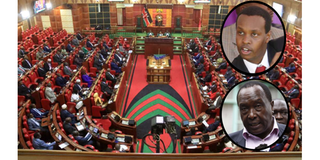How MPs survived losing seats despite skipping parliamentary sittings

Missing records in the 11th parliament helped save more than 260 MPs, including then Rongai MP Raymond Moi (inset, bottom) and Emgwen’s Alex Kosgey (inset, top), at risk of losing their parliamentary seats.
Missing records in the 11th parliament helped save more than 260 members of the National Assembly at risk of losing their parliamentary seats despite missing more than the maximum number of sittings provided for in the Constitution to force them out.
Details from the Parliament records office show even as former Rongai MP Raymond Moi and his Emgwen colleague Mr Alex Kosgey skived 102 and 79 sittings of the House respectively in the 11th Parliament, over 260 of their colleagues missed more than 50 sittings during the session but still maintained their parliamentary seats.
This is contrary to Article 103 of the Constitution that details the circumstances under which a member loses their seats and mandates the Speaker of the House to declare the seat vacant if a member fails to attend eight sittings of the House in a session.
“The office of an MP becomes vacant if during any session of Parliament, the member is absent from eight sittings of the relevant House without permission in writing from the Speaker and is unable to offer a satisfactory explanation for the absence,” the Article reads.
A paper presented to the members of the National Assembly during their induction at a city hotel shows that the missing parliamentary records were caused as the House was transitioning from analogue to digital.
Previously, MPs were required to record their presence in the debating chamber by writing down their names at the entry to the chamber compared to the current practice where they are only required to enter their biometrics.
“A probe was initiated to establish how this had happened only to discover that the records were lost during the transition from analogue record keeping to digital. The truant members could therefore not be punished on account that the information to fix them was missing,” the paper said.
“With the automation of the records, it will be easier in the 13th parliament and beyond to identify those who skip parliamentary sittings without a written permission from the Speaker,” the paper added.
But even as this emerged, the MPs protested that the provision in the constitution places them at a disadvantage considering that equally, they have too much to do at the constituency level.
Ambiguity in law
The MPs were in agreement that Parliament should not even bother fixing the constitutional provision in the rules whether informing the Speaker on a member’s absence should extend to text or WhatsApp messaging.
Rarieda MP Otiende Amollo said that the ambiguity in law will help the members escape any attempt to have them recalled.
“I want to warn you members that you let this matter be as unclear as possible. If you want to specify on the mode to notify the Speaker, you will make it so easy for someone to remove you from office. I want to warn you that if you do this, 90 percent of you will not make it,” said Mr Amollo.
Mr Amollo was among a group of experts who wrote the constitution. Yesterday he reiterated that the law must continue to remain as unclear as possible.
“Let me tell you, when we were making this law, we said eight sessions because we wanted members to attend sessions. What I didn’t know was the fact that I would also be a member. I have come to realize that it is so easy to skip eight sessions. What helped some of us in the last parliament is the ambiguity in law,” he said.
In the last parliament, two voters filed a petition in the National Assembly, seeking the removal of Mr Moi and Mr Kosgey for absconding parliamentary duty without permission from the Speaker.
The matter was referred to the Powers and Privileges Committee (PPC) for investigations with Mr Moi complaining that the petition was a political witch-hunt by his political opponents.
Then Sotik MP the late Dr Joyce Laboso, who was in the PPC chair at the time the petition was read on the floor of the House, asked members to ensure that they record their House attendance through the biometric registration facility available at the entrance of the debating chamber whenever they attend sittings.
Previously, then Rarieda MP Nicholas Gumbo and Mr John Mbadi, then Suba South MP currently nominated, said that Article 103 of the constitution was untenable noting that an amendment was the only way out.
In fact, Mr Gumbo had drafted a constitutional amendment noting that it is a right of an MP to attend to duties back at the constituency only that it never saw the light of day.





